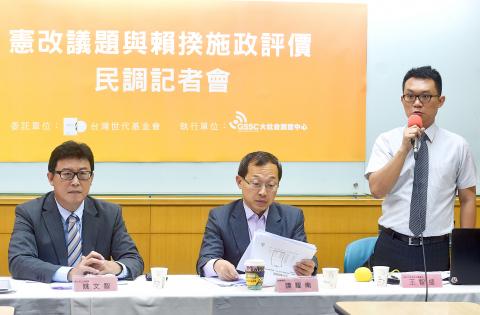Premier William Lai’s (賴清德) high approval rating of nearly 70 percent is believed to have helped boost President Tsai Ing-wen’s (蔡英文) rating toward 50 percent, while more than half of Taiwanese support a proposal to amend the Constitution, a poll released yesterday by the Taiwan Style Foundation showed.
Lai, who assumed the post on Sept. 8, has garnered the approval of 68.8 percent of respondents, while 23 percent expressed dissatisfaction.
Regarding Lai’s ability to revive the economy, 63.5 percent said they are confident, compared with 30.2 percent who said they were not, while 65.2 percent think his executive ability is good, compared with 21 percent who do not agree.

Photo: Chien Jung-fong, Taipei Times
The premier is heeding public opinion, according to 60.2 percent of respondents, while 30.3 percent said he is not.
Tsai’s approval rating stands at 49.7 percent, while her disapproval rating is at 45.1 percent. Just over half of respondents at 54.8 percent said they support Tsai, while 40.4 percent said they do not.
Tsai’s satisfaction rating had fallen to a record low of 18.4 percent in a poll released in May by Taiwan Democracy Watch ahead of the first anniversary of her presidency.
“In terms of polling performance, the [administration] has weathered an unstable period after Lai’s inauguration,” Democratic Progressive Party (DPP) Legislator Pasuya Yao (姚文智) said.
The poll suggests that controversies surrounding the administration’s reform policies have ended, while efficiently implementing the policies is to be the next challenge, foundation board director Wang Zhin-sheng (王智盛) said.
When asked about a proposal by Tsai and the DPP to amend the Constitution, 56 percent of respondents said they approve, while 22.1 percent disapproved.
Half of the respondents opposed lowering the minimum voting age from 20 to 18, while 46.8 percent approved of the potential constitutional amendment.
Human rights protection should be codified into the Constitution, 69.8 percent of the respondents said, but 17.3 percent said it is not necessary.
Seventy-two percent believe that legislative elections should be revised to prevent unequal representation, while 17.8 percent said the revision is not necessary.
While 80.9 percent of respondents are in favor of a proposal put forth by Tsai in her Double Ten National Day address to hold a political party leaders’ meeting, 13.6 percent disapproved.
Regarding cross-strait policy, two-thirds of respondents said they support Tsai’s statement that the nation would continue to show goodwill and stay true to its promises without returning to a confrontational relationship or succumbing to Beijing’s pressure, while 24.9 percent said they disapproved.
The poll conducted on Thursday and Friday collected 1,072 valid samples and has a confidence level of 95 percent with a margin of error of 2.99 percentage points.

US President Donald Trump yesterday announced sweeping "reciprocal tariffs" on US trading partners, including a 32 percent tax on goods from Taiwan that is set to take effect on Wednesday. At a Rose Garden event, Trump declared a 10 percent baseline tax on imports from all countries, with the White House saying it would take effect on Saturday. Countries with larger trade surpluses with the US would face higher duties beginning on Wednesday, including Taiwan (32 percent), China (34 percent), Japan (24 percent), South Korea (25 percent), Vietnam (46 percent) and Thailand (36 percent). Canada and Mexico, the two largest US trading

China's military today said it began joint army, navy and rocket force exercises around Taiwan to "serve as a stern warning and powerful deterrent against Taiwanese independence," calling President William Lai (賴清德) a "parasite." The exercises come after Lai called Beijing a "foreign hostile force" last month. More than 10 Chinese military ships approached close to Taiwan's 24 nautical mile (44.4km) contiguous zone this morning and Taiwan sent its own warships to respond, two senior Taiwanese officials said. Taiwan has not yet detected any live fire by the Chinese military so far, one of the officials said. The drills took place after US Secretary

CHIP EXCEPTION: An official said that an exception for Taiwanese semiconductors would have a limited effect, as most are packaged in third nations before being sold The Executive Yuan yesterday decried US President Donald Trump’s 32 percent tariff on Taiwanese goods announced hours earlier as “unfair,” saying it would lodge a representation with Washington. The Cabinet in a statement described the pledged US tariffs, expected to take effect on Wednesday next week, as “deeply unreasonable” and “highly regrettable.” Cabinet spokeswoman Michelle Lee (李慧芝) said that the government would “lodge a solemn representation” with the US Trade Representative and continue negotiating with Washington to “ensure the interests of our nation and industries.” Trump at a news conference in Washington on Wednesday announced a 10 percent baseline tariff on most goods

‘SPECIAL CHANNEL’: Taipei’s most important tasks are to stabilize industries affected by Trump’s trade tariffs and keep negotiations with Washington open, a source said National Security Council Secretary-General Joseph Wu (吳釗燮) arrived in the US for talks with US President Donald Trump’s administration, a source familiar with the matter said on Friday. Wu was leading a delegation for a meeting known as the “special channel,” the Financial Times reported earlier. It marked Trump’s first use of the channel since returning to the White House on Jan. 20. Citing a source familiar with the matter, the Financial Times reported that Minister of Foreign Affairs Lin Chia-lung (林佳龍) was also a part of the delegation. The visit came days after China concluded war games around Taiwan and amid Trump’s